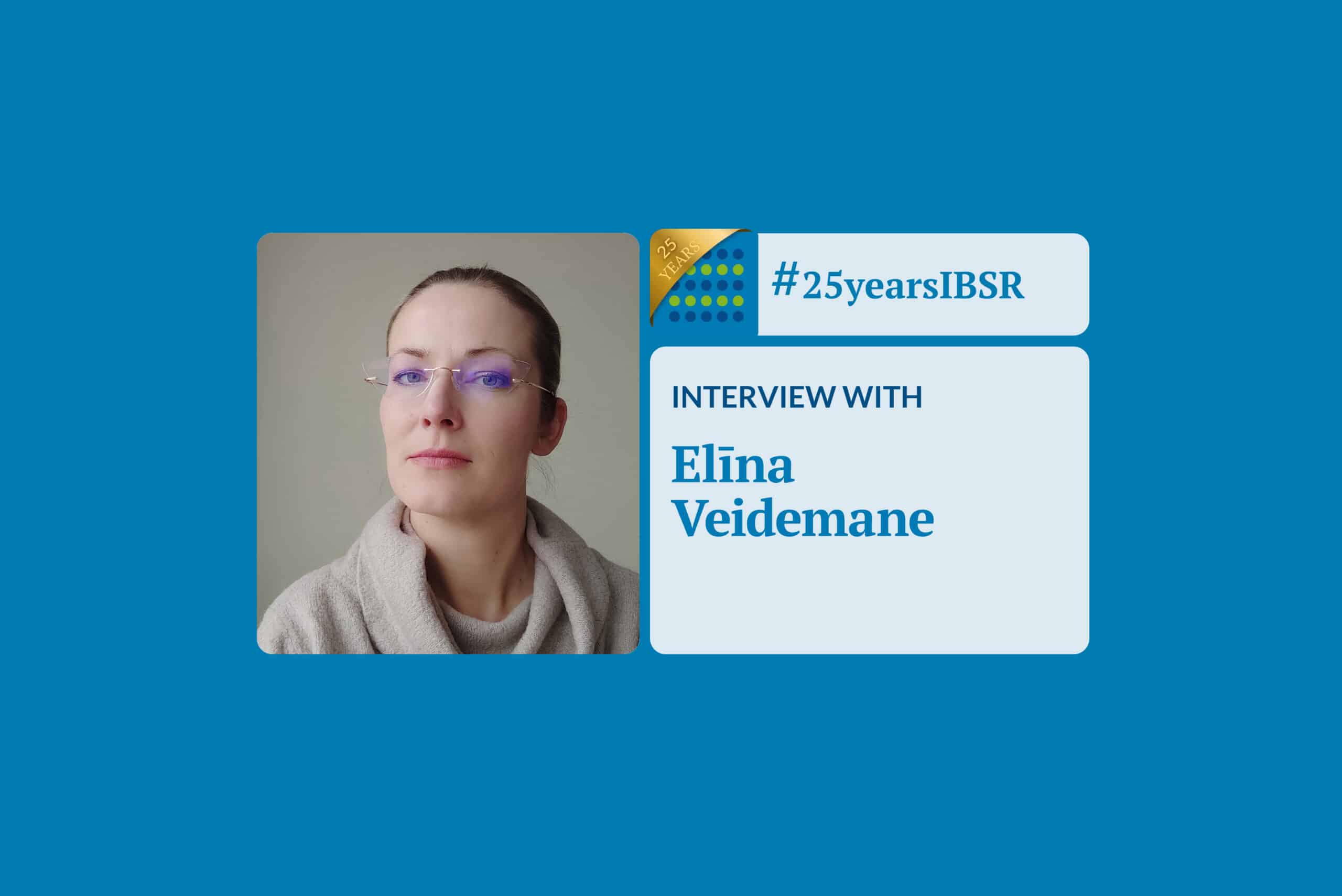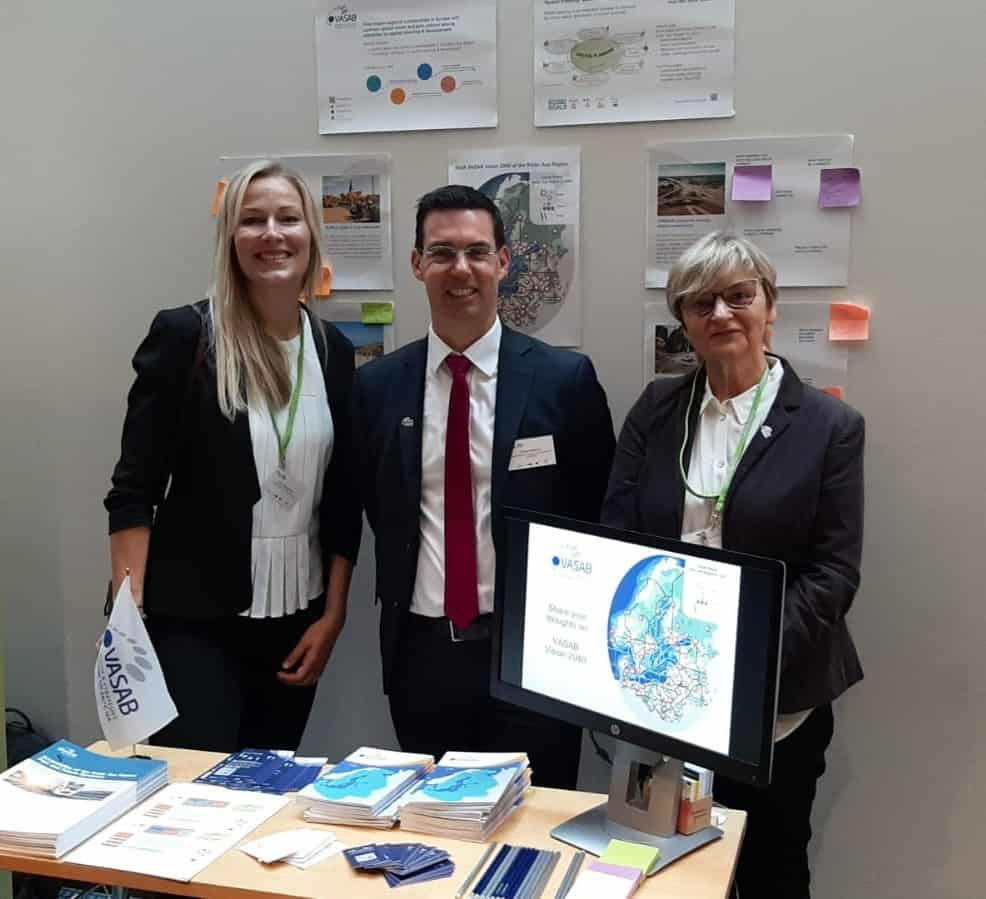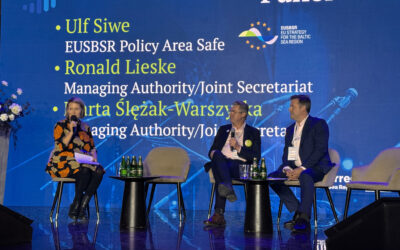
19 April 2023
Let’s do some more maritime spatial planning together!
#25yearsIBSR
Elīna Veidemane, Deputy Head of VASAB, intergovernmental cooperation on spatial planning and development in the Baltic Sea region, explains how Interreg helped advance maritime spatial planning in the region.
Anna Gałyga: What’s your first memory related to Interreg Baltic Sea Region?
It goes back to the year 2009 and the project BaltSeaPlan. At that time, I worked at the Latvian Ministry responsible for environment protection and regional development, and one of my tasks was to prepare national concept for introducing maritime spatial planning into national spatial planning system. For that time maritime spatial planning was completely new discipline, there was very little experience even in whole Baltic Sea Region. So we joined an Interreg BSR project BaltSeaPlan as an associated partner.
I remember project carried out several pilot cases in concrete maritime areas throughout the Baltic Sea. For example, in Latvia, the “Baltic Development Forum – Latvia” investigated how to do the maritime spatial planning for one part of the Latvian territorial waters and exclusive economic zone (EEZ) and helped to indicate first stakeholder groups to be involved in the process. Similar case-studies took place in Denmark, Estonia, Lithuania, Poland, Sweden and Germany.
BaltSeaPlan project brought a lot of valuable information and the first steps towards common understanding about maritime spatial planning and how to establish it at national scale.
It helped me prepare our national concept and I got to know where to look for more information. It also showed for the Ministry how it is beneficial to cooperate with other countries across the borders in very practical way.
The project BaltSeaPlan was one of the first initiatives that kicked off joint maritime spatial planning by countries in the region. How else has Interreg Baltic Sea Region affected the developments in this field?
When the EU Directive on Maritime Spatial Planning was in place, many countries started their processes for the first time. But some issues appeared on the way. For example, when there were first discussions about potential areas for wind parks in the Baltic Sea, we experienced strong resistance from fishermen and the shipping industry who treated the sea as “theirs”.
Interreg projects helped actively engage these groups, demonstrate the benefit of working together, and even build synergies. The projects allowed for a more comprehensive point of view; they opened up the planning processes to other sectors who have not been there before. Learning from such experiences in other countries is valuable in itself, too, and helps to bring a common understanding.
The project Baltic LINes particularly looked at how the energy sector could be linked to shipping. The Capacity4MSP platform looked at all projects dealing with maritime spatial planning or maritime management in the Programme and beyond. It is very valuable when you can analyse the projects in such a comprehensive way. I would also mention LandSeaAct project which addressed the coastal management and planning in the context of maritime spatial planning, as coastal areas are crucial for coherence between the sea and land. And then there was a project BalticRIM, which was about integrating maritime cultural heritage into maritime spatial planning.

©VASAB
Where do you think we would be today without all those Interreg projects?
It would probably take us more time to establish a dialogue across sectors and across countries: Interreg projects helped to boost it. And the level of common knowledge would be different: Interreg projects helped to amplify and exchange knowledge, and share it. And this is particularly important for spatial planning because the better knowledge you have, the better planning solutions you gain. Another aspect is also the engagement of different groups which were given the possibility to exchange and be heard – thanks to Interreg projects.
Do you think there’s space for more Interreg projects on maritime spatial planning?
Now, when national maritime spatial plans are in place, some countries start to revise them because of new demands by governments and the EU policies. New challenges related to e.g. energy or climate change are coming up, too. There is a need for new solutions to accommodate these challenges. Thinking of VASAB cooperation, its strategic framework is formed mainly by the VASAB vision 2040 which we expect to have endorsed soon and the Maritime Spatial Planning Roadmap 2030. Successful implementation of these documents depends on collaboration and joint work. And Interreg projects are one of the tools that help achieve that.
VASAB coordinates Policy Area Spatial Planning of the EU Strategy for the Baltic Sea Region. How do you see the role of the Programme in this context?
The Interreg Baltic Sea Region Programme is the first stop when we look for projects. We participate in some of them as partners; we advise others and we follow all of those related to spatial planning. Interreg Baltic Sea Region projects are a source of inspiration and contribution for our work and have great value to us. Relevant knowledge developed by projects is shared within our community. For example, we invite projects for VASAB events to demonstrate their results and use the project findings for our policy building.
What’s your birthday wishes for the Programme?
Happy birthday, Interreg Baltic Sea Region! Let everything that you do help create a striving Baltic Sea region! Both VASAB and the Programme, we work for the benefit of the region and better future for our people!
#25yearsIBSR
This year, our Interreg Baltic Sea Region Programme is celebrating its 25th anniversary. For more examples of #MadeWithIBSR project results and testimonials of great people who have helped shape the regions with us, visit our birthday celebrations page!
More recent news
D 3.4 Durability plan and transfer report for integration into existing infrastructures
Designing Interreg Baltic Sea Region that belongs to everyone
10 December 2025 Designing Interreg Baltic Sea Region that belongs to everyone Written by Eeva Rantama What if the next Interreg Baltic Sea Region...
Monitoring the Programme’s progress: transnational cooperation in the making
Representatives from nine Programme area countries gathered in Berlin on 19-20 November 2025 to review the progress of the Programme’s implementation and start preparing for the post-2027 period.
Beyond Borders: Turning Interreg Results into Policy Action
At this year’s EUSBSR Annual Forum in Sopot, the session “Beyond Borders: Interreg Results in Action for a Resilient and Safe Baltic Sea Region” showcased how Interreg Baltic Sea Region projects are transforming challenges into policy-relevant results that strengthen resilience, safety, and cooperation across the region. The session brought together project partners, EUSBSR policy area coordinators, members of the Programme Monitoring Committee and young participants to explore what it takes to turn project outcomes into lasting policy impact.





